- Home
- Raymond E. Feist
Magician: Master Page 2
Magician: Master Read online
Page 2
Laurie’s voice brought him from his reverie. “The overseer comes.”
Pug swore. If the overseer had to get himself dirty by wading in the water, then he would be in a foul mood—which could mean beatings, or a reduction in the chronically meager food. He would already be angered by the delay in the cutting. A family of burrowers—beaverlike six-legged creatures—had made themselves at home in the roots of the great trees. They would gnaw the tender roots, and the trees would sicken and die. The soft, pulpy wood would turn sour, then watery, and after a while the tree would collapse from within. Several burrower tunnels had been poisoned, but the damage had already been done to the trees.
A rough voice, swearing mightily while its owner splashed through the swamp, announced the arrival of the overseer, Nogamu. He himself was a slave, but he had attained the highest rank a slave could rise to, and while he could never hope to be free, he had many privileges and could order soldiers or freemen placed under his command. A young soldier came walking behind, a look of mild amusement on his face. He was clean-shaven in the manner of a Tsurani freeman, and as he looked up at Pug, the slave could get a good look at him. He had the high cheekbones and nearly black eyes that so many Tsurani possessed. His dark eyes caught sight of Pug, and he seemed to nod slightly. His blue armor was of a type unknown to Pug, but with the strange Tsurani military organization, that was not surprising. Every family, demesne, area, town, city, and province appeared to have its own army. How they all related one to another within the Empire was beyond Pug’s understanding.
The overseer stood at the base of the tree, his short robe held above the water. He growled like the bear he resembled and shouted up at Pug, “What’s this about another rotten tree?”
Pug spoke the Tsurani language better than any Midkemian in the camp, for he had been there longer than all but a few old Tsurani slaves. He shouted down, “It smells of rot. We should rerig another and leave this one alone, Slave Master.”
The overseer shook his fist. “You are all lazy. There is nothing wrong with this tree. It is fine. You only want to keep from working. Now cut it!”
Pug sighed. There was no arguing with the Bear, as all the Midkemian slaves called Nogamu. He was obviously upset about something, and the slaves would pay the price. Pug started hacking through the upper section, and it soon fell to the ground. The smell of rot was thick, and Pug removed the ropes quickly. Just as the last length was coiled around his waist, a splitting sound came from directly in front of him. “It falls!” he shouted down to the slaves standing in the water below. Without hesitation they all ran. The cry of “falls” was never ignored.
The bole of the tree was splitting down the middle now that the top had been cut away. While this was not common, if a tree was far enough gone for the pulp to have lost its strength, any flaw in the bark could cause it to split under its own weight. The tree’s branches would pull the halves away from each other. Had Pug been tied to the bole, the ropes would have cut him in half before they snapped.
Pug gauged the direction of the fall; then as the half he stood upon started to move, he launched himself away from it. He hit the water flat, back first, trying to let the two feet of water break his fall as much as possible. The blow from the water was immediately followed by the harder impact with the ground. The bottom was mostly mud, so there was little damage done. The air in his lungs exploded from his mouth when he struck, and his senses reeled for a moment. He retained enough presence of mind to sit up and gasp a deep lungful of air.
Suddenly a heavy weight hit him across the stomach, knocking the wind from him and pushing his head back underwater. He struggled to move and found a large branch across his stomach. He could barely get his face out of the water to get air. His lungs burned, and he breathed without control. Water came pouring down his windpipe, and he started to choke. Coughing and sputtering, he tried to keep calm but felt panic rise within him. He frantically pushed at the weight across him but couldn’t move it.
Abruptly he found his head above water; Laurie said, “Spit, Pug! Get the muck out of your lungs, or you’ll get lung fever.”
Pug coughed and spit. With Laurie holding his head, he could catch his breath.
Laurie shouted, “Grab this branch. I’ll pull him out from under.”
Several slaves splashed over, sweat beading their bodies. They reached underwater and seized the branch. Heaving, they managed to move it slightly, but Laurie couldn’t drag Pug out.
“Bring axes; we’ll have to cut the branch from the tree.”
Other slaves were starting to bring axes over when Nogamu shouted, “No. Leave him. We have no time for this. There are trees to cut.”
Laurie nearly screamed at him, “We can’t leave him! He’ll drown!”
The overseer crossed over and struck Laurie across the face with a lash. It cut deep into the singer’s cheek, but he didn’t let go of his friend’s head. “Back to work, slave. You’ll be beaten tonight for speaking to me that way. There are others who can top. Now, let him go!” He struck Laurie again. Laurie winced, but held Pug’s head above water.
Nogamu raised his lash for a third blow, but was halted by a voice from behind. “Cut the slave from under the branch.” Laurie saw the speaker was the young soldier who had accompanied the slave master. The overseer whirled about, unaccustomed to having his orders questioned. When he saw who had spoken, he bit back the words that were on his lips. Bowing his head, he said, “My lord’s will.”
He signaled for the slaves with the axes to cut Pug loose, and in short order Pug was out from under the branch. Laurie carried him over to where the young soldier stood. Pug coughed the last water from his lungs and gasped, “I thank the master for my life.”
The man said nothing, but when the overseer approached, directed his remarks to him. “The slave was right, and you were not. The tree was rotten. It is not proper for you to punish him for your bad judgment and ill temper. I should have you beaten, but will not spare the time for it. The work goes slowly, and my father is displeased.”
Nogamu bowed his head. “I lose much face in my lord’s sight. May I have his permission to kill myself?”
“No. It is too much honor. Return to work.”
The overseer’s face grew red in silent shame and rage. Raising his lash, he pointed at Laurie and Pug. “You two, back to work.”
Laurie stood, and Pug tried. His knees were wobbly from his near drowning, but he managed to stand after a few attempts.
“These two shall be excused work the rest of the day,” the young lord said. “This one”—he pointed to Pug—“is of little use. The other must dress those cuts you gave him, or festering will start.” He turned to a guard. “Take them back to camp and see to their needs.”
Pug was grateful, not so much for himself as for Laurie. With a little rest, Pug could have returned to work, but an open wound in the swamp was a death warrant as often as not. Infections came quickly in this hot, dirty place, and there were few ways of dealing with them.
They followed the guard. As they left, Pug could see the slave master watching them with naked hatred in his eyes.
—
THERE WAS A creaking of floorboards, and Pug came instantly awake. His slave-bred wariness told him that the sound didn’t belong in the hut during the dead of night.
Through the gloom, footfalls could be heard coming closer, then they stopped at the foot of his pallet. From the next pallet, he could hear Laurie’s sharp intake of breath, and he knew the minstrel was awake also. Probably half the slaves had been awakened by the intruder. The stranger hesitated over something, and Pug waited, tense with uncertainty. There was a grunt, and without hesitation Pug rolled off his mat. A weight came crashing down, and Pug could hear a dull thud as a dagger struck where his chest had been only moments before. Suddenly the room exploded with activity. Slaves were shouting and could be heard running for the door.
Pug felt hands reach for him in the dark, and a sharp pain exploded across his
chest. He reached blindly for his assailant and grappled with him for the blade. Another slash, and his right hand was cut across the palm. Abruptly the attacker stopped moving, and Pug became aware that a third body was atop the would-be assassin.
Soldiers rushed into the hut, carrying lanterns, and Pug could see Laurie lying across the still body of Nogamu. The Bear was still breathing, but from the way the dagger protruded from his ribs, not for long.
The young soldier who had saved Pug’s and Laurie’s lives entered, and the others made way for him. He stood over the three combatants and simply asked, “Is he dead?”
The overseer’s eyes opened, and in a faint whisper he said, “I live, lord. But I die by the blade.” A weak but defiant smile showed on his sweat-drenched face.
The young soldier’s expression betrayed no emotion, but his eyes looked as if ablaze. “I think not,” he said softly. He turned to two of the soldiers in the room. “Take him outside at once and hang him. There will be no honors for his clan to sing. Leave the body there for the insects. It shall be a warning that I am not to be disobeyed. Go.”
The dying man’s face paled, and his lips quivered. “No, master. I pray, leave me to die by the blade. A few minutes longer.” Bloody foam appeared at the corner of his mouth.
Two husky soldiers reached down for Nogamu and, with little thought for his pain, dragged him outside. He could be heard wailing the entire way. The amount of strength left in his voice was amazing, as if his fear of the rope had awakened some deep reserve.
They stood in frozen tableau until the sound was cut off in a strangled cry. The young officer then turned to Pug and Laurie. Pug sat, blood running from a long, shallow gash across his chest. He held his injured hand in the other. It was deeply cut, and his fingers wouldn’t move.
“Bring your wounded friend,” the young soldier commanded Laurie.
Laurie helped Pug to his feet, and they followed the officer out of the slave hut. He led them across the compound to his own quarters and ordered them to enter. Once inside, he instructed a guard to send for the camp physician. He had them stand in silence until the physician arrived. He was an old Tsurani, dressed in the robes of one of their gods—which one the Midkemians couldn’t tell. He inspected Pug’s wounds and judged the chest wound superficial. The hand, he said, would be another matter.
“The cut is deep, and the muscles and tendons have been cut. It will heal, but there will be a loss of movement and little strength for gripping. He most likely will be fit for only light duty.”
The soldier nodded, a peculiar expression on his face: a mixture of disgust and impatience. “Very well. Dress the wounds and leave us.”
The physician set about cleaning the wounds. He took a score of stitches in the hand, bandaged it, admonished Pug to keep it clean, and left. Pug ignored the pain, easing his mind with an old mental exercise.
After the physician was gone, the soldier studied the two slaves before him. “By law, I should have you hanged for killing the slave master.”
They said nothing. They would remain silent until commanded to speak.
“But as I hanged the slave master, I am free to keep you alive, should it suit my purpose. I can simply have you punished for wounding him.” He paused. “Consider yourselves punished.”
With a wave of his hand he said, “Leave me, but return here at daybreak. I have to decide what to do with you.”
They left, feeling fortunate, for under most circumstances they would now be hanging next to the former slave master. As they crossed the compound, Laurie said, “I wonder what that was about.”
Pug responded, “I hurt too much to wonder why. I’m just thankful that we will see tomorrow.”
Laurie said nothing until they reached the slave hut. “I think the young lord has something up his sleeve.”
“Whatever. I have long since given up trying to understand our masters. That’s why I’ve stayed alive so long, Laurie. I just do what I’m told to, and I endure.” Pug pointed to the tree where the former overseer’s body could be seen in the pale moonlight—only the small moon was out tonight. “It’s much too easy to end up like that.”
Laurie nodded. “Perhaps you’re right. I still think about escape.”
Pug laughed, a short, bitter sound. “Where, singer? Where could you run? Toward the rift and ten thousand Tsurani?”
Laurie said nothing. They returned to their pallets and tried to sleep in the humid heat.
—
THE YOUNG OFFICER sat upon a pile of cushions, cross-legged in Tsurani fashion. He sent away the guard who had accompanied Pug and Laurie, then motioned for the two slaves to sit. They did so hesitantly, for a slave was not usually permitted to sit in a master’s presence.
“I am Hokanu, of the Shinzawai. My father owns this camp,” he said without preamble. “He is deeply dissatisfied with the harvest this year. He has sent me to see what can be done. Now I have no overseer to manage the work, because a foolish man blamed you for his own stupidity. What am I to do?”
They said nothing. He asked, “You have been here, how long?”
Pug and Laurie answered in turn. He considered the answers, then said, “You”—pointing at Laurie—“are nothing unusual, save you speak our tongue better than most barbarians, all things considered. But you”—pointing at Pug—“have stayed alive longer than most of your stiff-necked countrymen and also speak our language well. You might even pass for a peasant from a remote province.”
They sat still, unsure of what Hokanu was leading up to. Pug realized with a shock that he was probably older by a year or two than this young lord. He was young for such power. The ways of the Tsurani were very strange. In Crydee he would still be an apprentice, or if noble, continuing his education in statecraft.
“How do you speak so well?” he asked of Pug.
“Master, I was among the first captured and brought here. There were only seven of us among so many Tsurani slaves. We learned to survive. After some time, I was the only one left. The others died of the burning fever or festering wounds, or were killed by the guards. There were none for me to talk with who spoke my own language. No other countryman came to this camp for over a year.”
The officer nodded, then to Laurie said, “And you?”
“Master, I am a singer, a minstrel in my own land. It is our custom to travel broadly, and we must learn many tongues. I have also a good ear for music. Your language is what is called a tone language on my world; words with the same sound save for the pitch with which they are spoken have different meanings. We have several such tongues to the south of our Kingdom. I learn quickly.”
A glimmering appeared in the eyes of the soldier. “It is good to know these things.” He lapsed deep into thought. After a moment he nodded to himself. “There are many considerations that fashion a man’s fortune, slaves.” He smiled, looking more like a boy than a man. “This camp is a shambles. I am to prepare a report for my father, the Lord of the Shinzawai. I think I know what the problems are.” He pointed at Pug. “I would have your thoughts on the subject. You have been here longer than anyone.”
Pug composed himself. It had been a long time since anyone had asked him to venture an opinion on anything. “Master, the first overseer, the one who was here when I was captured, was a shrewd man, who understood that men, even slaves, cannot be made to work well if they are weak from hunger. We had better food and if injured were given time for healing. Nogamu was an ill-tempered man who took every setback as a personal affront. Should burrowers ruin a grove, it was the fault of the slaves. Should a slave die, it was a plot to discredit his oversight of the work force. Each difficulty was rewarded by another cut in food, or in longer work hours. Any good fortune was regarded as his rightful due.”
“I suspected as much. Nogamu was at one time a very important man. He was the hadonra—demesne manager—of his father’s estates. His family was found to be guilty of plotting against the Empire, and his own clan sold them all into slavery, those that wer
e not hanged. He was never a good slave. It was thought that giving him responsibility for the camp might find some useful channel for his skills. It proved not to be the case.
“Is there a good man among the slaves who could command ably?”
Laurie inclined his head, then said, “Master, Pug here…”
“I think not. I have plans for you both.”
Pug was surprised and wondered what he meant. He said, “Perhaps Chogana, master. He was a farmer, until his crops failed and he was sold into slavery for taxes. He has a level head.”
The soldier clapped his hands once, and a guard was in the room in an instant. “Send for the slave Chogana.”
The guard saluted and left. “It is good that he is Tsurani,” said the soldier. “You barbarians do not know your place, and I hate to think what would happen should I leave one in charge. He would have my soldiers cutting the trees while the slaves stood guard.”
There was a moment of silence, then Laurie laughed. It was a rich, deep sound. Hokanu smiled. Pug watched closely. The young man who had their lives in his hands seemed to be working hard at winning their trust. Laurie appeared to have taken a liking to him, but Pug held his feelings in check. He was further removed from the old Midkemian society, where war made noble and commoner comrades-in-arms, able to share meals and misery without regard for rank. One thing he had learned about the Tsurani early on was that they never for an instant forgot their station. Whatever was occurring in this hut was by this young soldier’s design, not by chance. Hokanu seemed to feel Pug’s eyes upon him and looked at him. Their eyes locked briefly before Pug dropped his as a slave is expected to do. For an instant a communication passed between them. It was as if the soldier had said: You do not believe that I am a friend. So be it, as long as you act your part.
With a wave of his hand, Hokanu said, “Return to your hut. Rest well, for we will leave after the noon meal.”

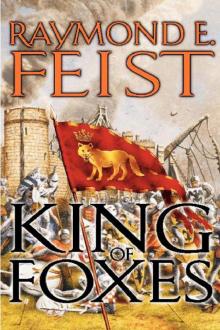 King of Foxes
King of Foxes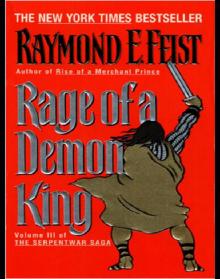 Rage of a Demon King
Rage of a Demon King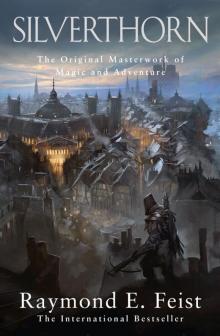 Silverthorn
Silverthorn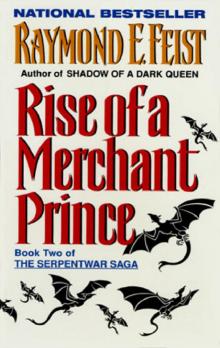 Rise of a Merchant Prince
Rise of a Merchant Prince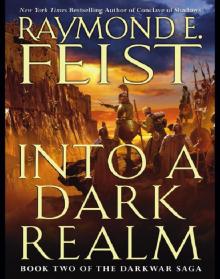 Into a Dark Realm: Book Two of the Darkwar Saga
Into a Dark Realm: Book Two of the Darkwar Saga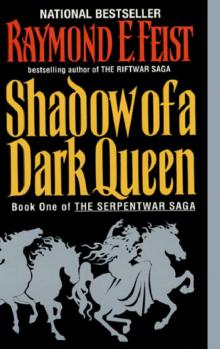 Shadow of a Dark Queen
Shadow of a Dark Queen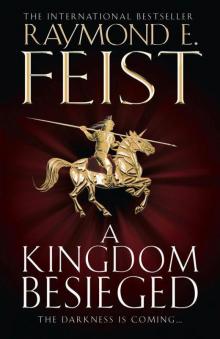 A Kingdom Besieged
A Kingdom Besieged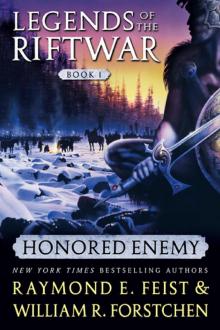 Honored Enemy
Honored Enemy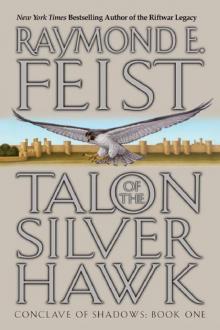 Talon of the Silver Hawk
Talon of the Silver Hawk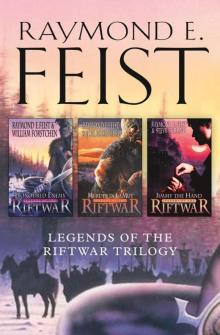 The Complete Legends of the Riftwar Trilogy
The Complete Legends of the Riftwar Trilogy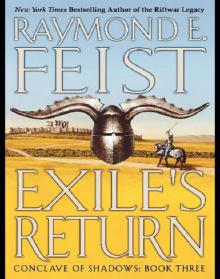 Exile's Return: Conclave of Shadows: Book Three
Exile's Return: Conclave of Shadows: Book Three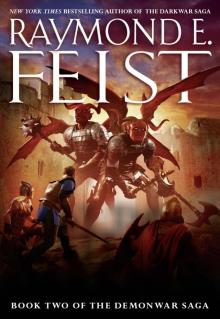 At the Gates of Darkness
At the Gates of Darkness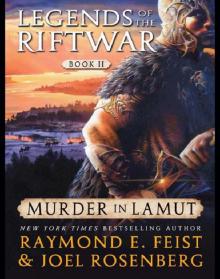 Murder in LaMut: Legends of the Riftwar: Book II
Murder in LaMut: Legends of the Riftwar: Book II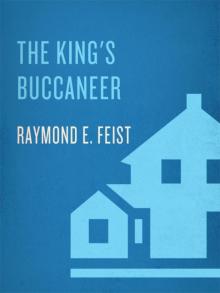 The King's Buccaneer
The King's Buccaneer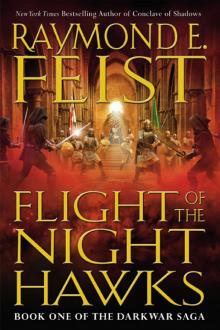 Flight of the Nighthawks
Flight of the Nighthawks The Riftwar Saga
The Riftwar Saga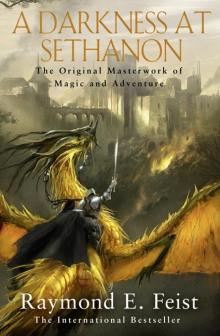 A Darkness at Sethanon
A Darkness at Sethanon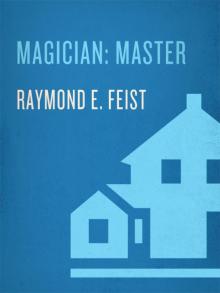 Magician: Master
Magician: Master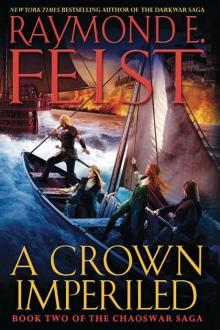 A Crown Imperiled
A Crown Imperiled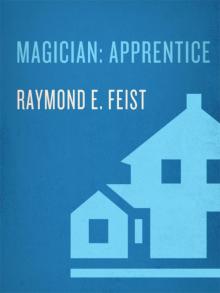 Magician: Apprentice
Magician: Apprentice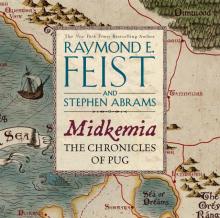 Midkemia
Midkemia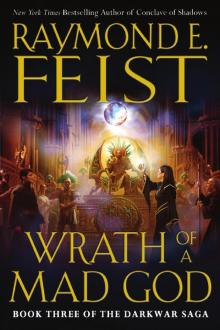 Wrath of a Mad God
Wrath of a Mad God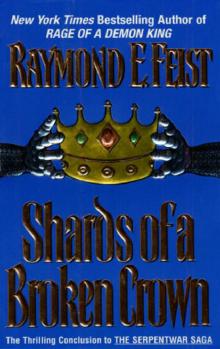 Shards of a Broken Crown
Shards of a Broken Crown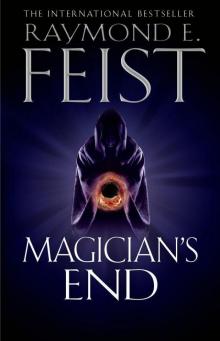 Magician's End
Magician's End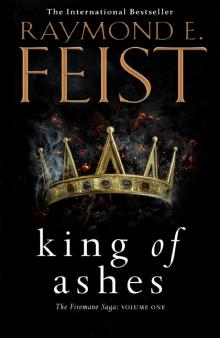 King of Ashes
King of Ashes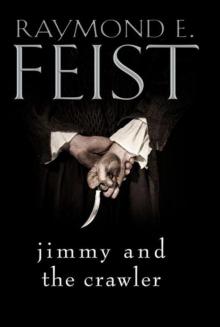 Jimmy and the Crawler
Jimmy and the Crawler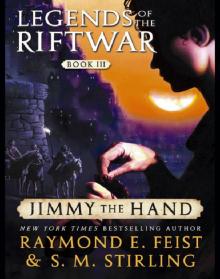 Jimmy the Hand: Legends of the Riftwar, Book 3
Jimmy the Hand: Legends of the Riftwar, Book 3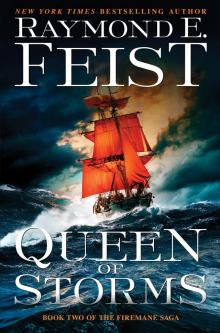 Queen of Storms
Queen of Storms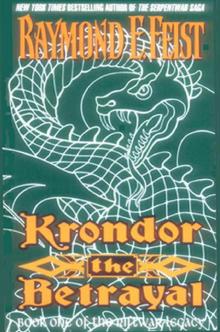 Krondor: The Betrayal
Krondor: The Betrayal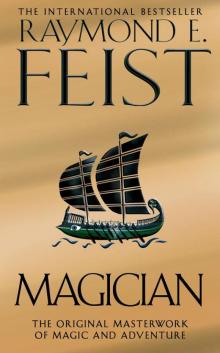 Magician
Magician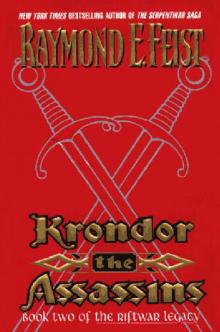 Krondor: The Assassins
Krondor: The Assassins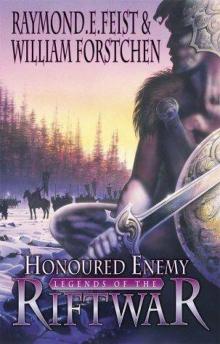 Honoured Enemy
Honoured Enemy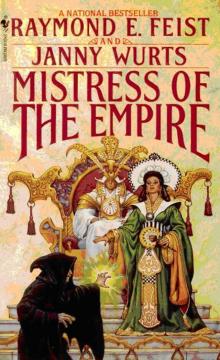 Mistress of the Empire
Mistress of the Empire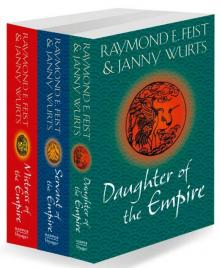 The Complete Empire Trilogy
The Complete Empire Trilogy Legends 1 - Honoured Enemy
Legends 1 - Honoured Enemy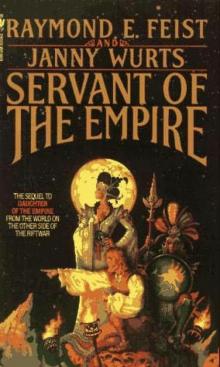 Empire - 02 - Servant Of The Empire
Empire - 02 - Servant Of The Empire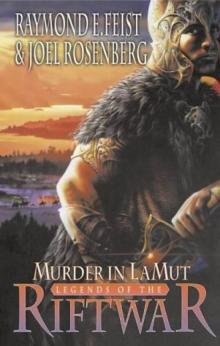 Murder In LaMut
Murder In LaMut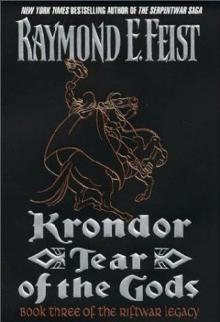 Krondor Tear of the Gods
Krondor Tear of the Gods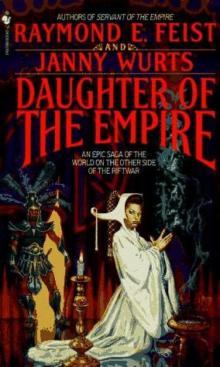 Empire - 01 - Daughter Of The Empire
Empire - 01 - Daughter Of The Empire![King of Ashes [Book One] Read online](http://i1.bookreadfree.com/i1/03/30/king_of_ashes_book_one_preview.jpg) King of Ashes [Book One]
King of Ashes [Book One]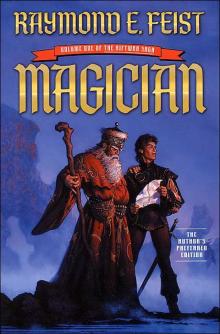 Magician (10th Aniversary Edition)
Magician (10th Aniversary Edition)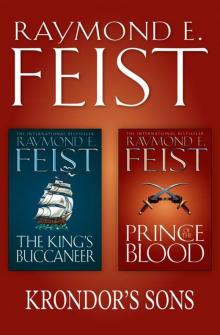 Prince of the Blood, the King's Buccaneer
Prince of the Blood, the King's Buccaneer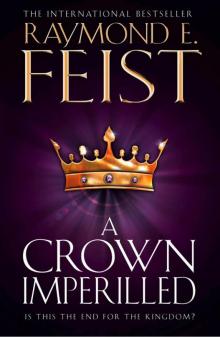 A Crown Imperilled cs-2
A Crown Imperilled cs-2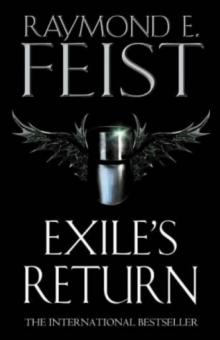 Exile's Return
Exile's Return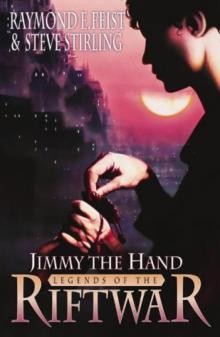 Jimmy the Hand
Jimmy the Hand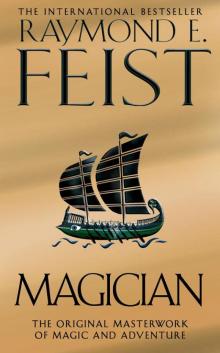 Book 1 - Magician
Book 1 - Magician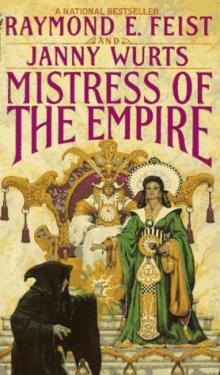 Empire - 03 - Mistress Of The Empire
Empire - 03 - Mistress Of The Empire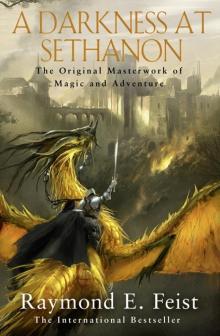 Darkness at Sethanon
Darkness at Sethanon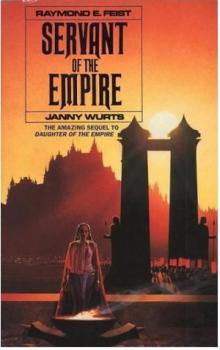 Servant of the Empire
Servant of the Empire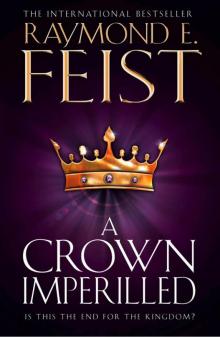 A Crown Imperilled
A Crown Imperilled Rides a Dread Legion
Rides a Dread Legion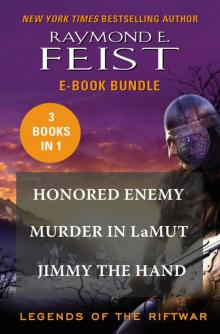 Legends of the Riftwar
Legends of the Riftwar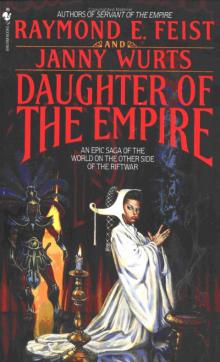 Daughter of the Empire
Daughter of the Empire The Riftwar Saga Trilogy: Magician, Silverthorn and A Darkness at Sethanon
The Riftwar Saga Trilogy: Magician, Silverthorn and A Darkness at Sethanon